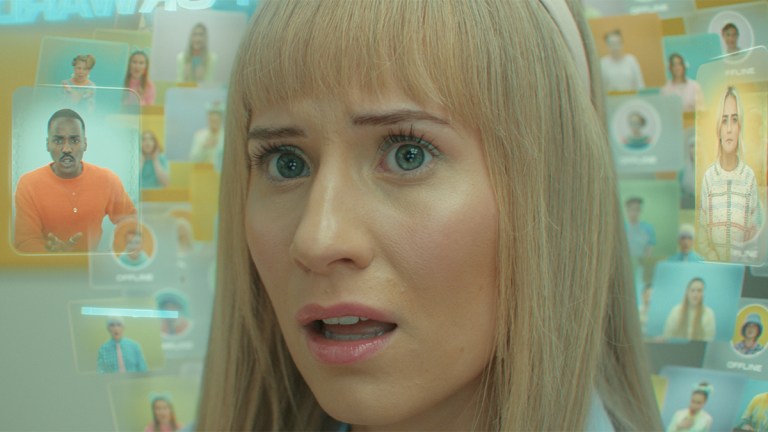Doctor Who Series 14 Episode 5 Review: Dot and Bubble
Too bleak, or a useful satirical conversation-starter for young viewers? SPOILERS.

Warning: this Doctor Who review contains spoilers.
When teasing “Dot and Bubble”, Russell T Davies described the episode to Doctor Who Magazine as a “step into Black Mirror territory”. It certainly wears that inspiration on its sleeve, down to the specific instalment of Black Mirror it seems to be aping, “Nosedive”. The arch, vaguely Stepfordian tone, the broad swipe at social media, and the pastel tones of the production design are all very evocative of that episode of Charlie Brooker’s dark anthology show.
But this story of a far-future gated community where vapid rich kids are being systematically eaten alive by horrifying giant slugs also owes a tonal debt to Black Mirror. While for the most part a pitch-dark comedy, and generally pretty effective on that front, “Dot and Bubble” also shares Black Mirror’s self-consciously bleak world view, which – like the aforementioned vapid rich kids – takes some digesting.
Davies has form in this department. While he has embraced the celebratory and humanistic side of Doctor Who since resurrecting it back in 2005, he’s also frequently taken the opportunity to express a fairly dim view of human nature. Episodes like “Midnight” and “Turn Left” (both of which felt very present in the DNA of “73 Yards”) show humanity at our worst – petty, vindictive, selfish, and arguably not worth saving. Though of course the Doctor always tries to anyway.
Here, we have an episode where, having begrudgingly accepted the Doctor and Ruby’s help as remote assistants mediated through the titular bubble, Lindy Pepper-Bean (Callie Cooke) and her friends unequivocally rebuff the offer of further aid. And it’s made pretty explicit why.
They’re all massive racists.
On first viewing, my interpretation of this grim and very well-acted climax was that the inhabitants of Finetime rejected the Doctor and Ruby because they were poor. Davies has form with class dynamics, from Rose Tyler and her family in the first two seasons of New Who, all the way back to his 1996 New Adventures novel Damaged Goods. Ruby’s reaction is pointedly scathing when she realises it’s a colony full of “rich kids” who only work two hours a day, and it makes sense that a shower of privileged, self-absorbed brats like this would see characters like Ruby and the Doctor as lower class.
But there was something else going on in this scene, something more uncomfortable, and on second viewing it becomes incredibly obvious. All of Lindy’s friends – in fact, all the inhabitants of Finetime – are white. Lindy is immediately hostile towards the Doctor when his face first appears in her bubble, and later it takes nearly 10 minutes of talking to him for her to realise that she already encountered him earlier that day – her line “I thought that you just looked the same” feels on the nose in retrospect.
Then at the climax, Lindy says “You, sir, are not one of us … screen to screen contact is just about acceptable but in person, impossible”, Hoochy Pie refers to the TARDIS as “voodoo”, and Brewster Cavendish tells the ladies to turn away before they’re “contaminated”. All this cold contempt is very clearly directed specifically at the Doctor, rather than the Doctor and Ruby as a pair.
Realistically, with the Doctor being played by a Black actor for the first time (with all due respect to Jo Martin’s Fugitive Doctor), this was going to come up at some point, just as the Jodie Whittaker era was always destined to contend with the Doctor being played by a woman. Most fans probably expected – as with “The Witchfinders”, arguably the Whittaker era’s most explicit engagement with the Thirteenth Doctor’s gender – that this would happen during a historical episode. In fact, some were surprised that it didn’t come up in relation to the 1960s setting of “The Devil’s Chord”. That would have been the obvious option – and perhaps the easier one.
Instead, the Ncuti Gatwa era’s first real engagement with racism comes in a technologically advanced far-future setting. The Doctor comes to this world to help, solves the mystery and offers to get everybody out, but is rebuffed because of his perceived racial inferiority.
It’s an upsetting conclusion, and depressing in the same way that the future government’s warped ‘pro-life’ philosophy in “Space Babies” was depressing – even in the future, humankind is still acting out these age-old prejudices. Ncuti Gatwa and Millie Gibson, who otherwise don’t have a huge amount to do in the episode apart from providing exposition and – admittedly very funny – reactions, certainly play Ruby’s quiet heartbreak and the Doctor’s visceral, tearful rage brilliantly. We’re in no doubt about the gravity of what’s happening.
But as with Black Mirror, there’s a point where the bleakness starts to feel nihilistic. There is a streak of mean-spiritedness throughout “Dot and Bubble”, much of which is expressed as dark comedy. The revelation that Finetime’s computer system has developed sentience, decided it hates humans, and has devised a horrific but surprisingly efficient method to dispose of them, is kind of delightful in its grimness, like something from the Sylvester McCoy era.
The ending, however, is nasty in the way that so many Black Mirror endings are – a twist of the knife that doesn’t necessarily expand upon or illuminate any of the themes, but is there for the sake of twisting the knife. Coming so soon after Lindy’s shockingly callous sacrifice of Ricky September (Tom Rhys Harries), it almost feels like the episode is mocking us for having once had any investment in her plight. And it’s that viciousness, rather than the somewhat scattershot ‘old man yells at cloud’ nature of the satire – Finetime’s social media network is literally called the “bubble”, get it?! – that sits uncomfortably.
Of course, discussions of racism should be uncomfortable. But as a theme, it deserves more engagement than we get here. It’s bigger and more important than a vicious twist ending. If Doctor Who is going to tackle racism through the prism of its new lead actor, then it needs to do more work unpacking it (preferably with a non-white writer involved).
There’s a lot of good stuff in “Dot and Bubble”, directed by Dylan Holmes Williams. Guest star Callie Cooke is excellent, skilfully threading a very tricky needle as a character who is by design, first difficult and then impossible, to empathise with. The production design is solid. The slugs are memorably horrible. A lot of the dark humour lands. But those last few minutes stick in the mind, and it doesn’t feel like there’s enough meat there to justify them. You could imagine Rick & Morty doing an episode like this, with Rick choosing to abandon the inhabitants of Finetime at the end with a shrug and a burp and a flippant ‘turns out they’re all huge racists, Morty, so f**k ‘em’. There’s certainly some deeply bitter humour to be mined from the ending. But we need a bit more than that from Doctor Who.
We’re more than halfway through the new series now, and apart from the Steven Moffat-penned “Boom”, Russell T Davies has sole screenwriting credit on the last eight episodes of the show. That’s quite a run, and the new era has largely been cooking on gas – bumpy in places, but generally energised and invigorating, with a fantastic Doctor-companion paring and loads of interesting ideas being explored in wildly different ways. But it’s good for the show that next episode “Rogue” is credited to two different writers, because “Dot and Bubble” suggests that Davies is in danger of over-indulging his more pessimistic impulses.
Undoubtedly, part of the fun of Doctor Who is being able to see it try on different outfits. But ‘Doctor Who does Black Mirror’ needs to be more than the sum of those parts. We already have Black Mirror. Doctor Who has fundamentally different goals as a show, and despite the ambition and craft on display here, it feels like it’s falling slightly short of them.
Doctor Who series 14 continues on BBC One, BBC iPlayer and Disney+ on Friday June 7 and Saturday June 8.
Learn more about Den of Geek’s review process and why you can trust our recommendations here.
